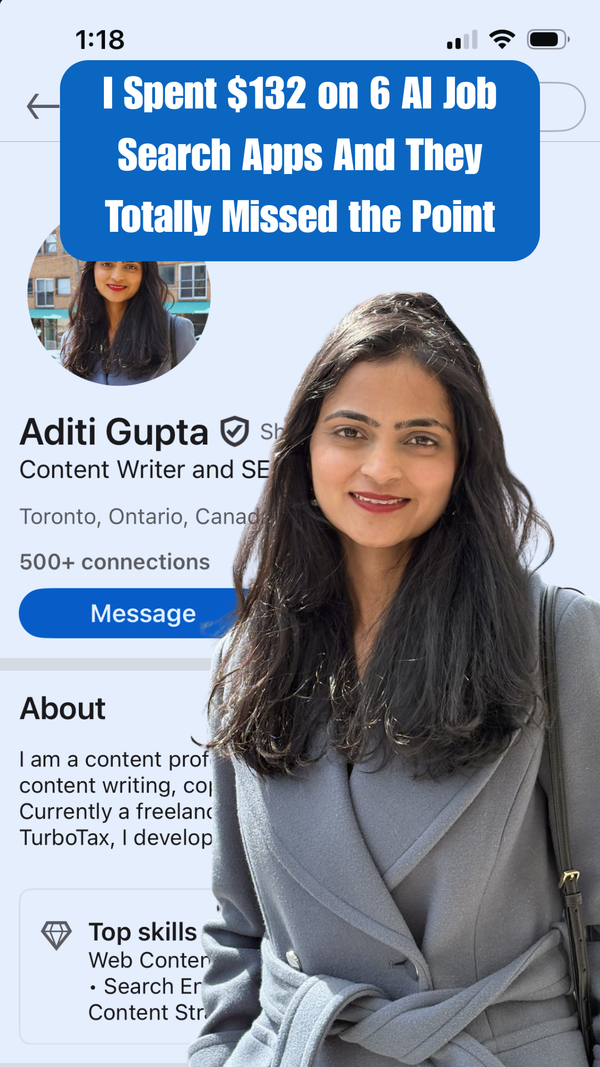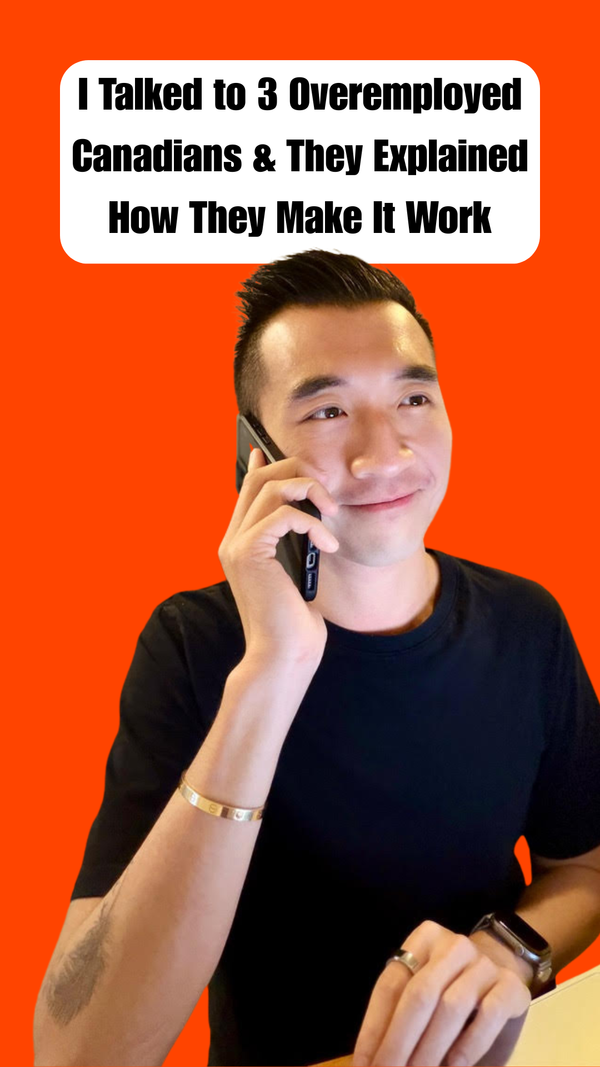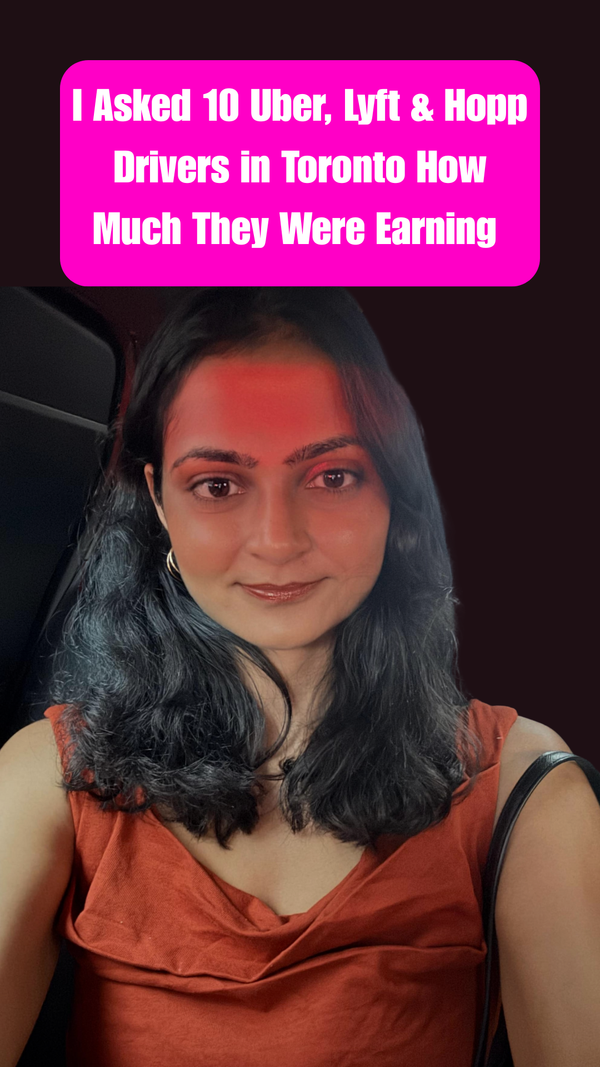I wasn’t actually looking for a new job, but curiosity got the better of me. What if AI really could take over the worst part of job hunting? So, for one week, I signed up for 4 AI job search tools and 2 AI interview assistants. These apps claimed they could write my cover letters, tailor my resume, fill out screening questions, and even answer interview questions in real time. By the end of the week, I had spent $132.56, applied to 526 jobs, and the results were nothing like what TikTok promised.
Simplify: The Only Tool That Almost Tried
I started my robot job hunt with Simplify. The free version felt too limited, so I paid $28.67 for the weekly plan. The setup was quite smooth. I uploaded my resume, picked my preferences (company size, industries, values, and salary range), and hit search.
The dashboard promised a “Matches” section, where AI would find jobs for me, but I quickly learned I’d be spending most of my time in the manual search tab.

For the first 5 days, I got 8-9 job matches daily, but by the end of the week, Simplify started glitching, showing just 3 matches and resurfacing jobs I’d already applied for or were expired.
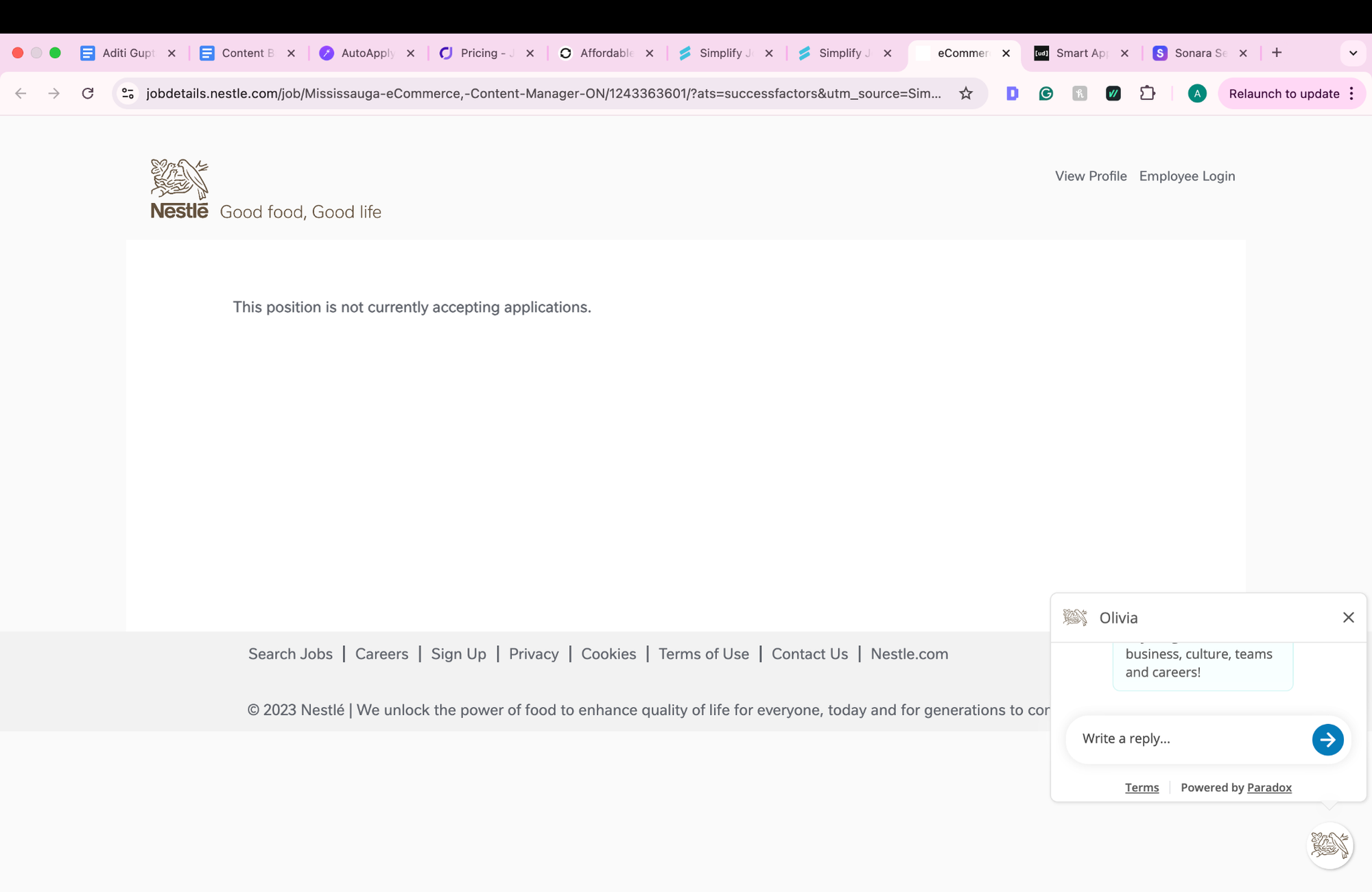
I used its autofill extension to save time, but it mostly made things up. On one form, it proudly declared I’d “traveled to the U.S.” (I hadn’t). On another, it changed my pronouns to he/him. The AI cover letter tool was worse. It basically paraphrased my resume, slapped “Dear Hiring Manager” at the top, and called it a day.
To its credit, Simplify had a few smart features:
- A keyword match tool that highlighted phrases to add to my resume.
- A resume builder that offered AI-generated lines for each keyword.
- A “smart tailoring” tool that rewrote my resume for every job description.
The tailoring tool sounded great until it went off the rails. It turned my fintech experience into “e-commerce” and proudly invented random statistics:
“Increased site visibility by 20% in 7 months by producing compelling copywriting for e-commerce initiatives.”
Even with all its flaws, Simplify felt like the only tool that actually tried to match me with real jobs. In total, I applied to 62 jobs through Simplify and got 2 recruiter replies, the best ratio of any platform I tested.
LoopCV: The Spammy Auto-Applier
Next, I tried LoopCV’s $20.99 standard monthly plan. You create a “loop” for each job search, pick cover letter and email templates, upload your resume, and let the process begin. It works in three ways. It can email your resume to company contacts, fill out applications on LinkedIn through its extension (which never worked for me), or redirect you to company sites to apply manually.
My plan didn’t include the AI autofill feature, so most external applications still took time. I briefly considered upgrading to the premium plan for autofill, but since the LinkedIn extension was already broken, I decided not to waste more money. Its built-in CV editor didn’t help either. It basically mashed my bullet points into paragraphs.
The email system was fun to play with at first. I picked the Straightforward Application template and let it run.
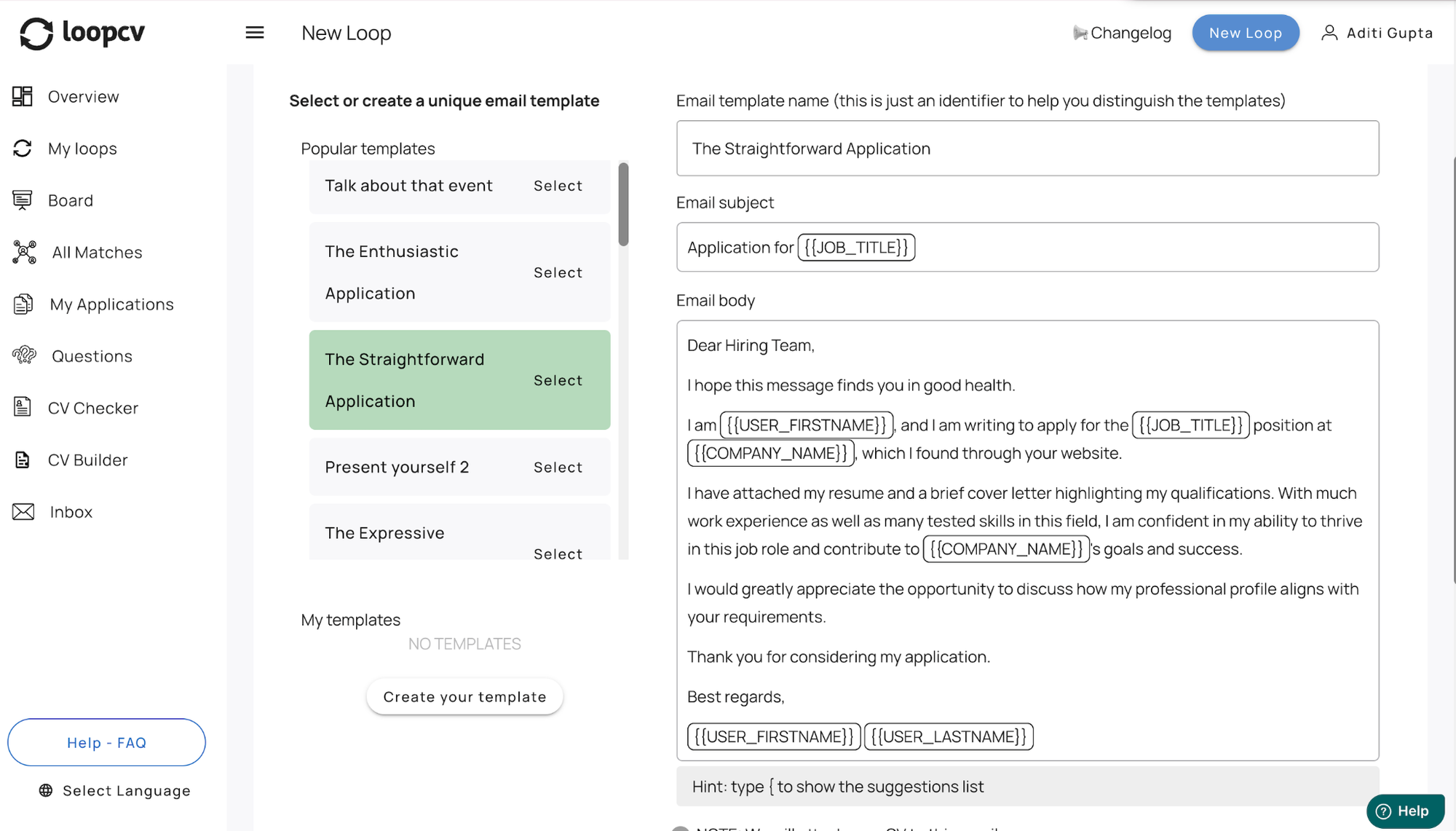
Within a day, I started getting replies, but from the wrong companies! Look at this reply from Blender, the 3D software company in the Netherlands:

What I learned fast-
- Many of LoopCV’s job postings were expired, duplicated, or completely off-target.
- It emails companies with no vacancies or even the wrong company altogether.
- A few messages went straight to generic inboxes, which then politely told me to stop.
By day four, I gave up on LoopCV and just let it run in the background, quietly spamming the internet with my resume. In total, I applied for 165 jobs and didn’t hear back from even one.
Job Copilot: It Knows You Better Than You Do
Job Copilot claimed it would get smarter the more I used it. I started with the $8.90-a-week plan, but quickly realized most of the smarter features, like tailoring your CV for each job, were locked behind the $12.90 Elite plan. So I upgraded.
The first few applications were a mess. The tool decided I had ten years of SEO experience, even though my resume clearly said four. Then it started inventing stories for me. In one application, it proudly claimed I’d simplified sleep science for a wellness client and even quoted my “final copy.” None of it was real.
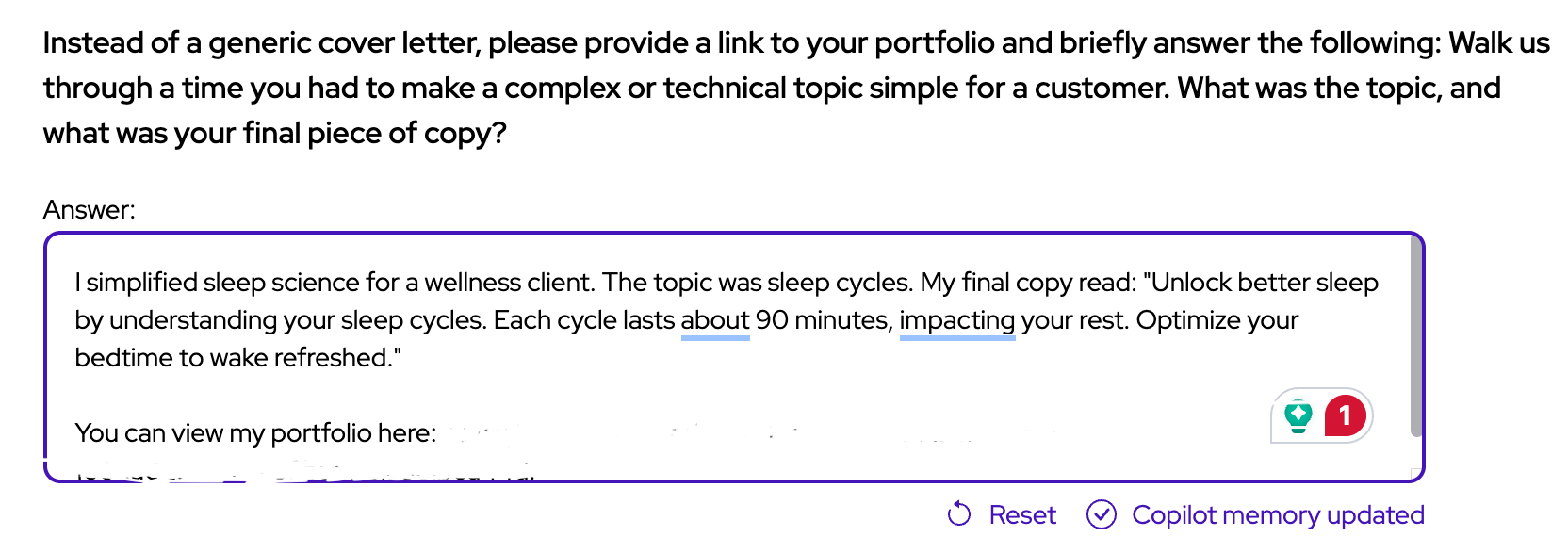
The resume tailoring feature was supposed to edit my resume for each posting, but it was a nightmare to use. It rearranged my work history, broke the formatting, and refused to save changes. On day two, I installed the Chrome extension, hoping it would make external applications easier; instead, it autofilled only my most recent experience and skipped the rest.
The strangest part was that it kept matching me with on-site roles in Australia, the U.S., and India, even though I clearly set my location to Canada. One was entirely in German.
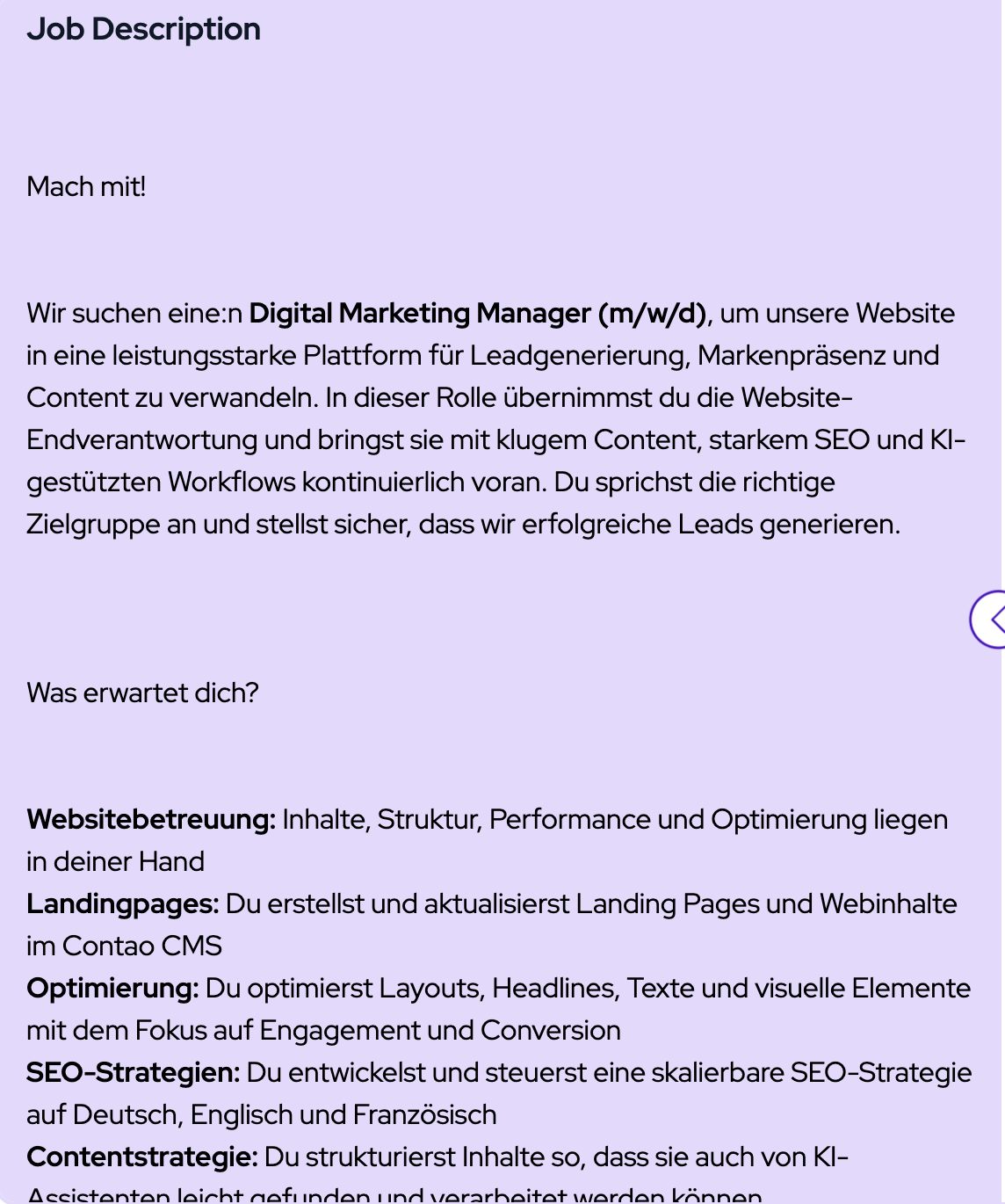
By the end, the tool did seem to learn a little. It stopped making up new career milestones and started sounding slightly less robotic. With my subscription about to expire, I went all in on the last day and mass-applied to 130+ jobs without reading or editing most answers. Out of 212 total applications, I got one reply that felt like a pity clap from the algorithm.
Undetectable AI: The Most Useless $50 I’ve Ever Spent
Lastly, I tried Undetectable AI as it promised “invisible automation” and smarter job matching. It offered a three-day free trial, then $50 a month for the full plan. I figured I’d test it before paying. The trouble started right away with its resume parser. It turned my professional CV into something that looked like a template written by ChatGPT in 2019.
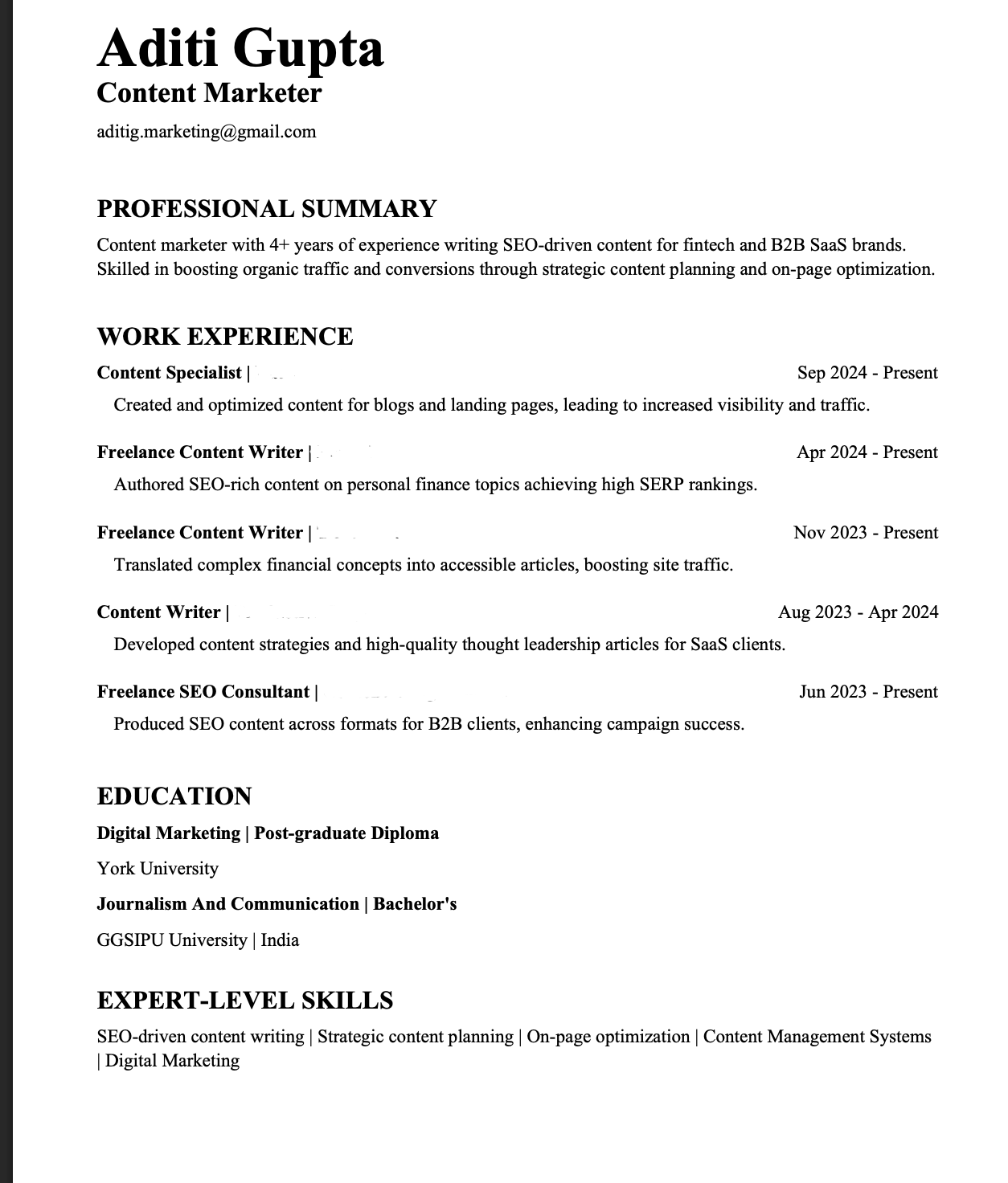
Then came the “Smart Applier.” The tool claims to partner with multiple job boards, but every time I clicked “Apply for Jobs,” it redirected to ZipRecruiter, and most sessions ended in a crash. I even had to create a separate ZipRecruiter profile just to get it to run at all. Once it finally started working, here’s what went wrong:
- Tabs kept collapsing mid-process, even on the paid plan.
- I couldn’t see or edit what answers the AI was filling in.
- The only control I had was a vague “AI Job Match Threshold” slider (0–100) that supposedly controlled how selective the tool was. But even at 60%, it still applied to UX designer and demand gen roles I’d never pick myself.
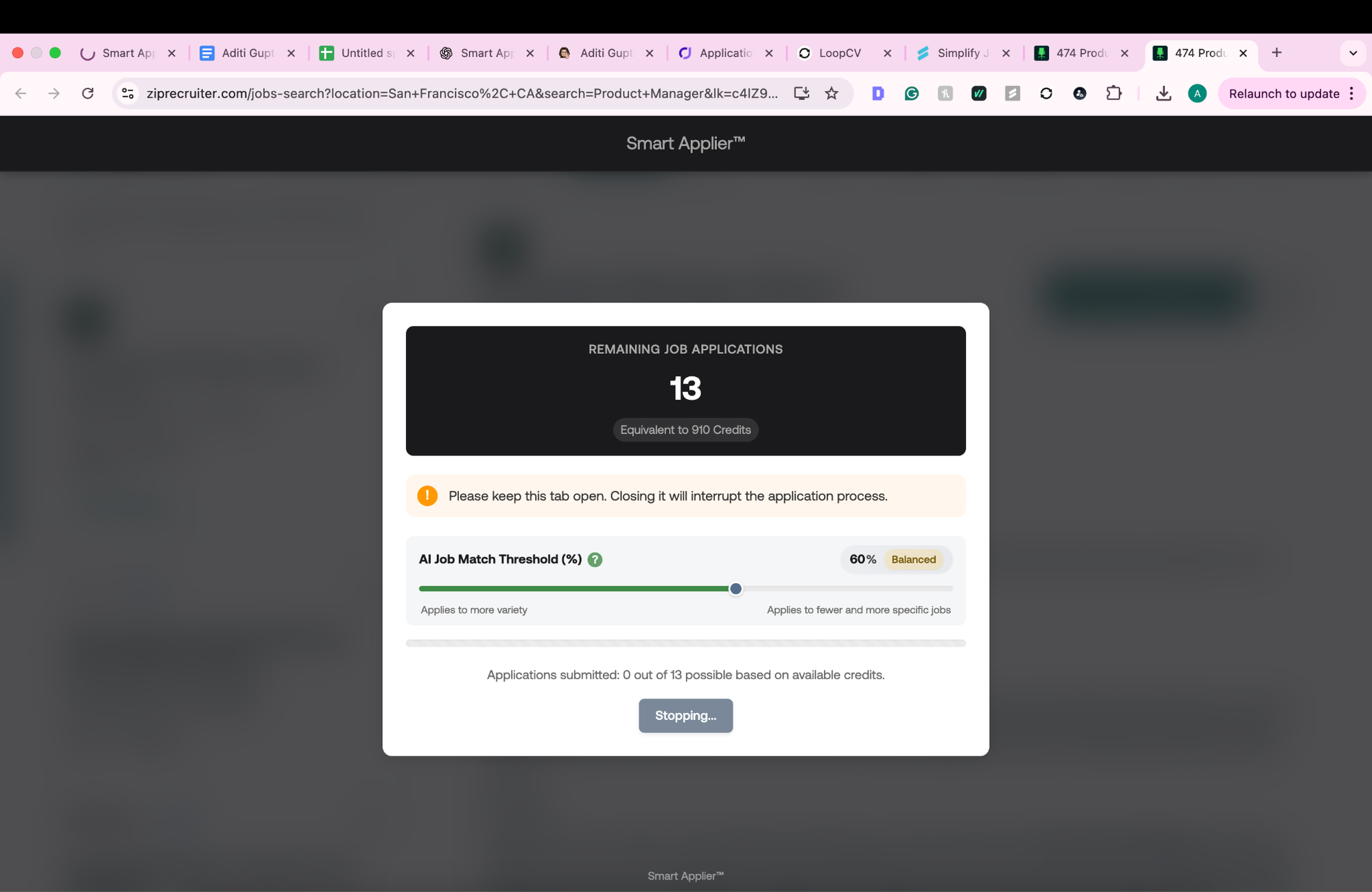
In theory, my plan could apply to 500 jobs, but I couldn’t choose which ones. One day, I left the software running for two hours. It applied to 14 jobs, with six of them being irrelevant. One required 35+ years of experience, one was in South Africa, and for one application, the software slashed my expected salary by $10,000 without asking.
The final straw came when I got an email copy of one of my applications. The AI had left my cover letter blank and entered my preferred start date as September 2024.
In total, I applied for 87 jobs but didn’t hear back from a single one.
What Happened When AI Tried to Talk (And Write) For Me
After over 500 job applications across four platforms, I finally got a few responses: two interviews and one written assignment. This was my chance to test if AI could actually help me land a job.
1. Cluely Killed My Confidence Faster Than Any Interviewer
For my first interview, a Digital Copywriter Manager role I landed through Job Copilot, I tested Cluely, an AI interview assistant that promised real-time cheating during calls. I paid $20 for the full version and decided to go in with almost minimal prep, just to see how far the AI could carry me.
The interface looked sleek enough. I didn’t have to switch tabs or open a second window to get the answers. Cluely simply overlaid itself on top of my call screen and let me toggle features like:
- What should I say? (auto-suggested answers mid-call)
- Follow-up questions
- Fact-check
- Recap
But the moment I actually started talking, things went downhill fast. For a question like “What project are you most proud of?”, it fed me the most generic possible answer with no numbers, no examples, no story.
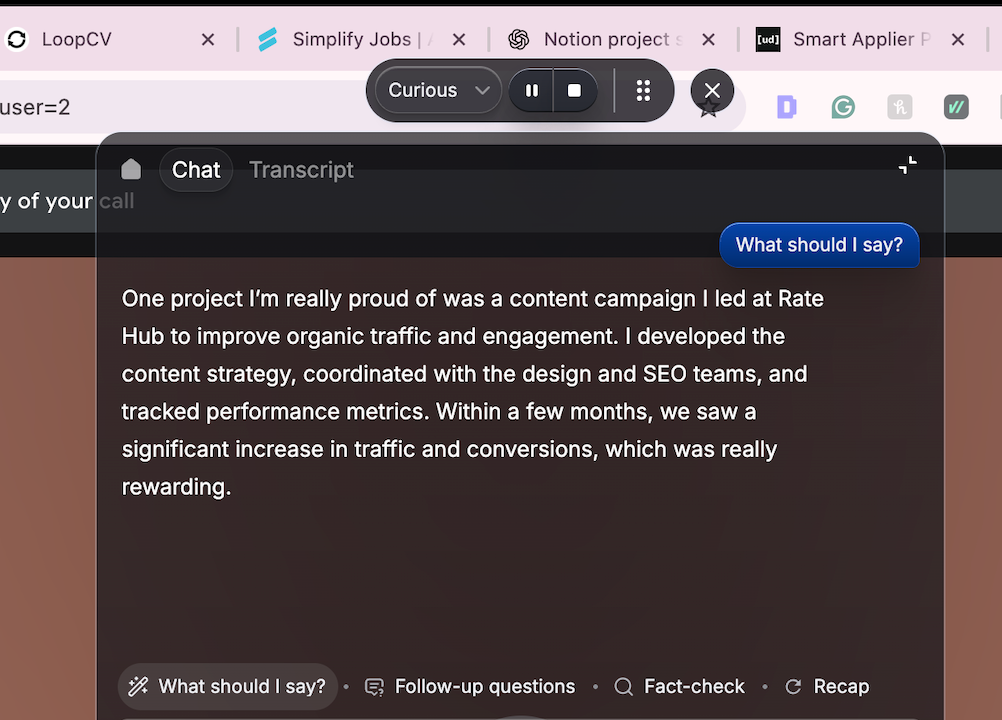
When the interviewer probed further on what I actually did on that project, I froze. The AI hadn’t prepared me for that level of detail. I ended up fumbling my way through an improvised version.
Even the “follow-up” feature, which was supposed to help me close the interview strongly, suggested just two painfully bland questions. The conversation fizzled out in ten minutes, a call that was supposed to last thirty.
2. Interviews Chat Failed to Coach Me Even with Two AIs
I got another email for an on-demand video interview from a job I submitted through Simplify. It was a pre-recorded setup where I had to record answers to timed questions. The perfect testing ground for another tool.
I signed up for the free version of Interviews Chat, which promised AI-generated answers in real time. Unlike Cluely, it didn’t overlay on my interview screen. I had to keep a separate tab open to see the answers, which meant I was constantly switching windows while trying to look composed on camera.
It used two AI tools to answer: ChatGPT and Copilot, but that only made things worse. I had to pick which version to read from in a few seconds, and at the same time maintain eye contact with the camera.
Each response took almost 30 seconds to generate, which would’ve been brutal on a live call. And when the answers finally appeared, they sounded exactly like ChatGPT. Lines like “Amidst my journey as a content strategist…” made me want to laugh mid-recording. Reading them out loud didn’t feel natural at all, and it SHOWED! Watching the replay, I looked like I was reading from a teleprompter at gunpoint.
3. Undetectable AI Couldn’t Write About AI
By this point, I’d gone through AI tools that could apply and talk for me, so it only made sense to see if one could write for me too. I got another email for a job I’d applied to through Simplify, asking me to submit a 1,000-word blog on “The Role of AI in Marketing.” How fitting.
Side note: Why are companies sending full-length blog assignments with 24-hour deadlines and version history on? It felt like a writer’s version of the Hunger Games.
Anyway, I opened Undetectable AI’s SEO Writer tool, and immediately hit a wall. You can’t actually upload or paste a brief. Instead, you have to fill in generic fields like:
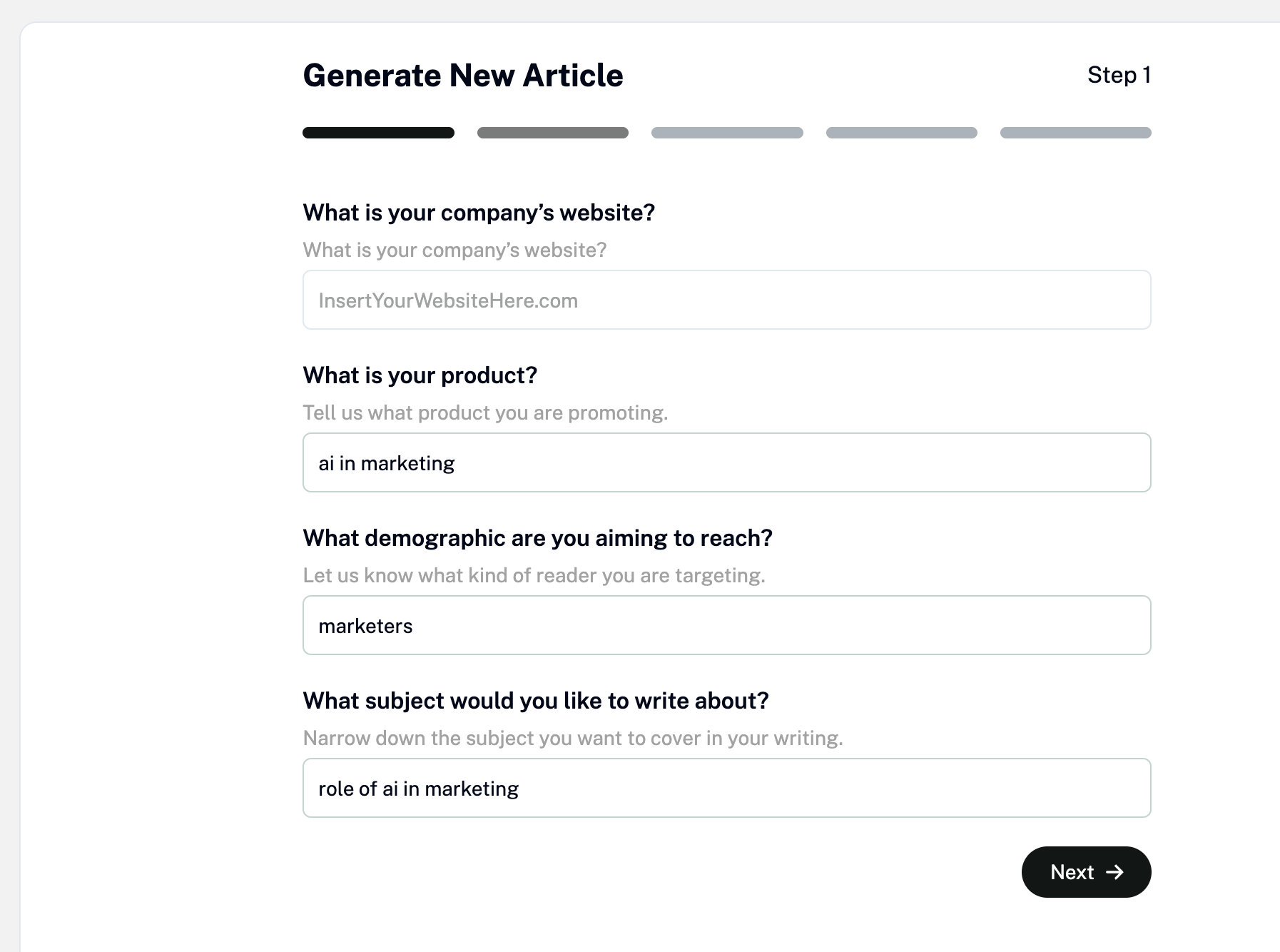
Once you fill in the prompts, it spat out a bunch of irrelevant topics that had nothing to do with the actual task.
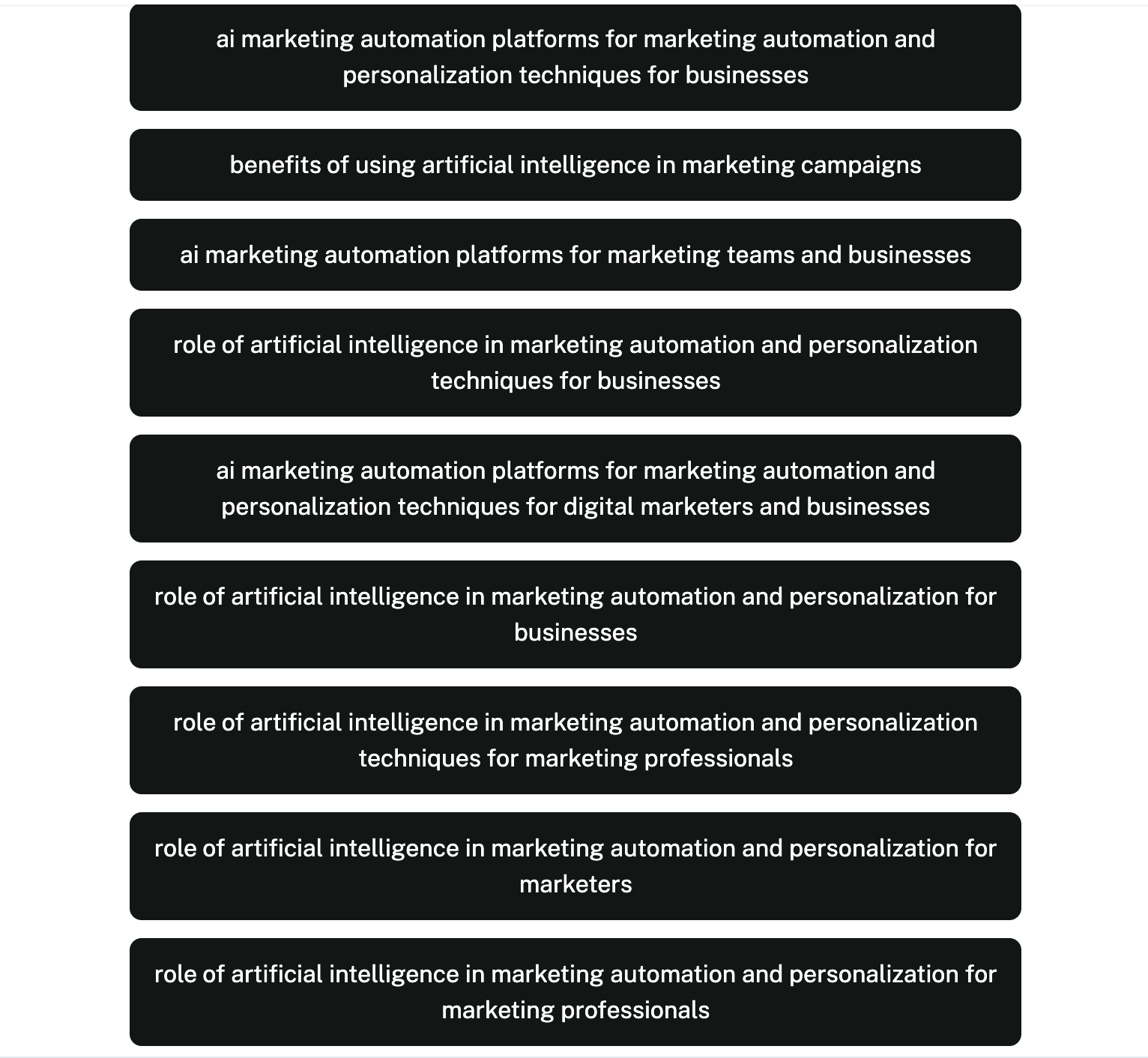
Each result was a keyword salad, with no option to edit or rephrase. So I tried the Essay Writer tool next, thinking maybe a different format would fix the issue. The tool ignored structure and keywords completely, and gave me a 750-word block of text that stopped halfway through the outline because of its word limit.
After hours of testing combinations of both tools, I gave up. Neither could handle a simple content brief. And honestly, I wasn’t about to spend my own energy on an unpaid 24-hour writing test for a job I didn’t even want.
What I Learned About AI Job Search in Canada
After a week of AI-led job hunt, I ended up with 527 applications, two interviews, one writing test, and a renewed appreciation for human judgment. Here’s how the tools stacked up:
I thought I’d compare these results with a real, human job search. So, I looked at my numbers from last year, when I was applying for a job right after school. I sent 70 tailored applications and 45 Easy Applies on LinkedIn, and landed 10 interviews in two months. That’s one interview for every 11 applications. With AI, it was one for every 175.
My human job search was slower but thoughtful. I researched companies, personalized my applications, and chose roles that actually fit my skills. The AI tools didn’t do any of that. They blasted my resume into the void, often to expired listings, irrelevant positions, or even jobs in other countries. I think these robots owe me a refund.
Would I Use AI for A Job Search Again?
Probably not. After a week of watching six apps fumble through my career history, I’m convinced AI can’t replace my real effort. These job search tools can automate and summarize perfectly well, but can’t understand nuance. They don’t know when a job posting has expired, when a company is ghosting applicants, or when you’re wildly overqualified for a “Junior Content Intern” role.
I might use them for small things, like checking a few keywords or tidying up a sentence, but I would never let an app apply, write, or talk for me again.

